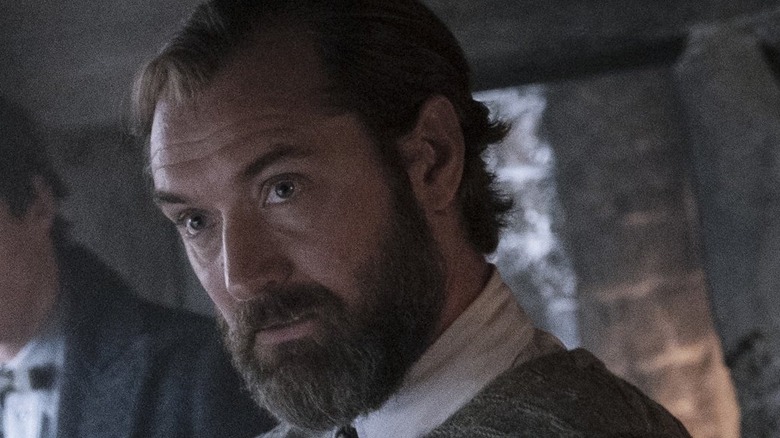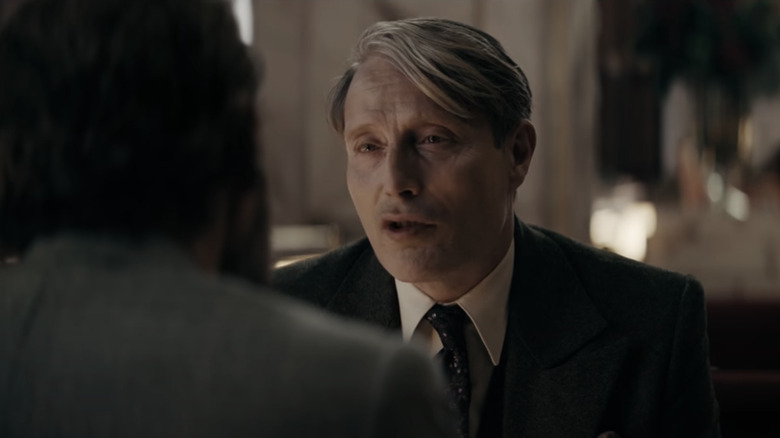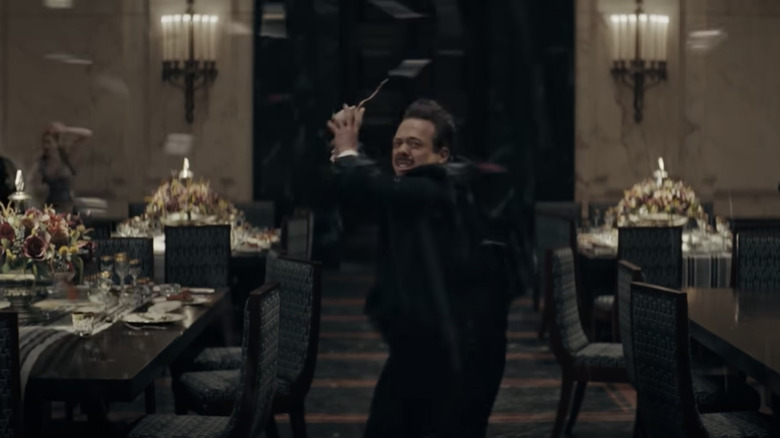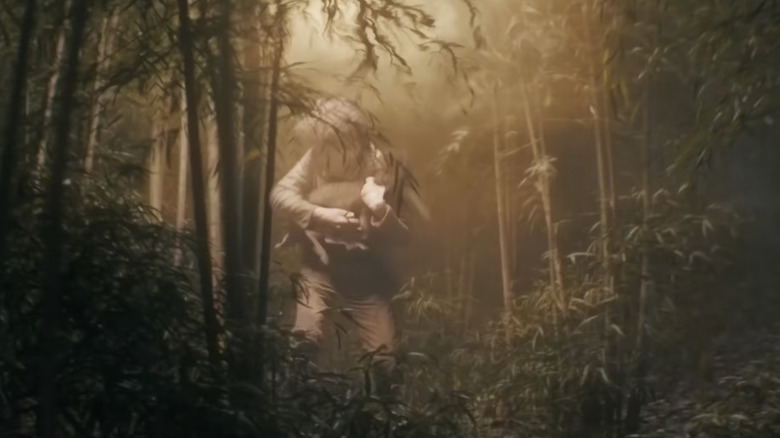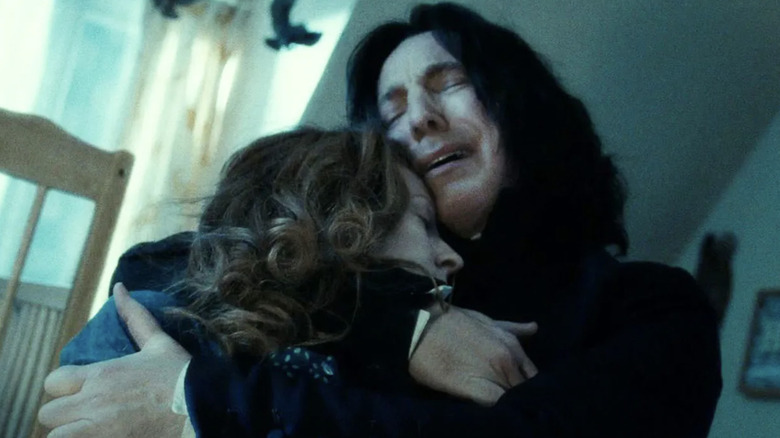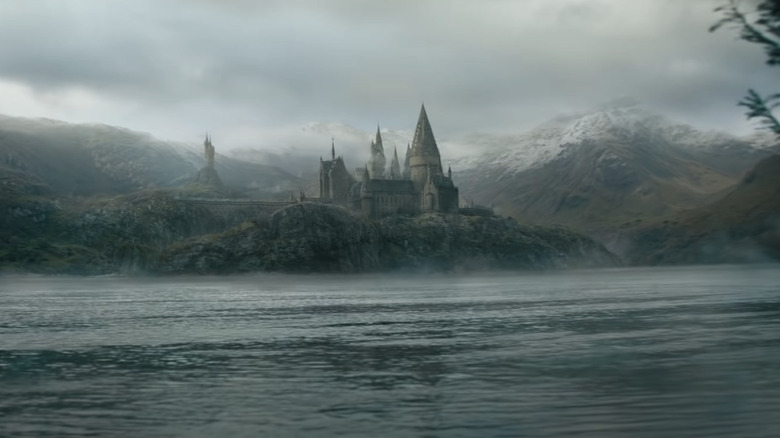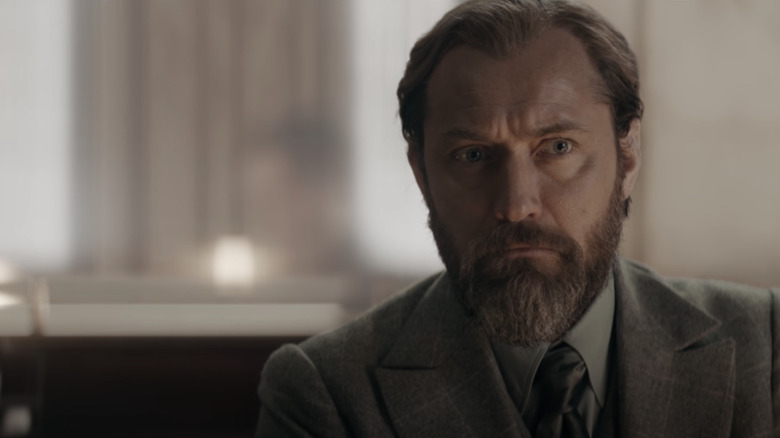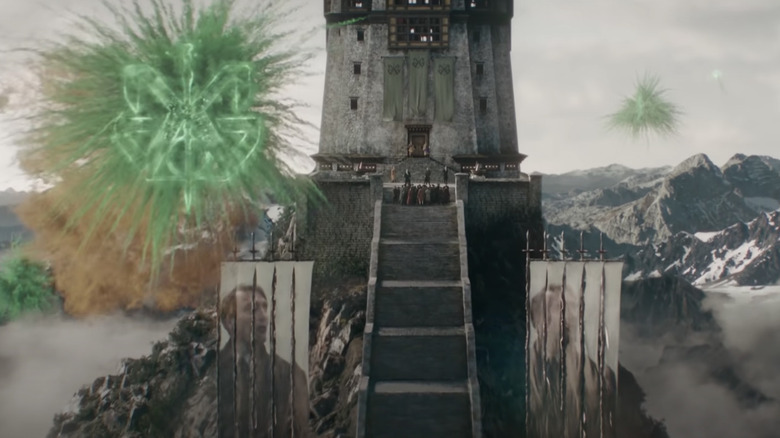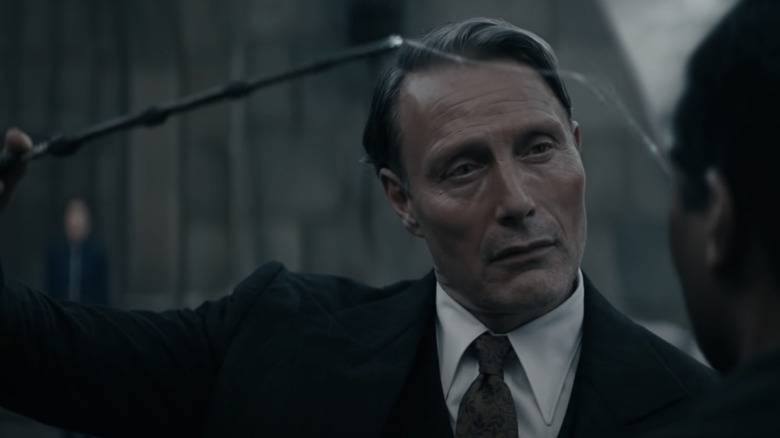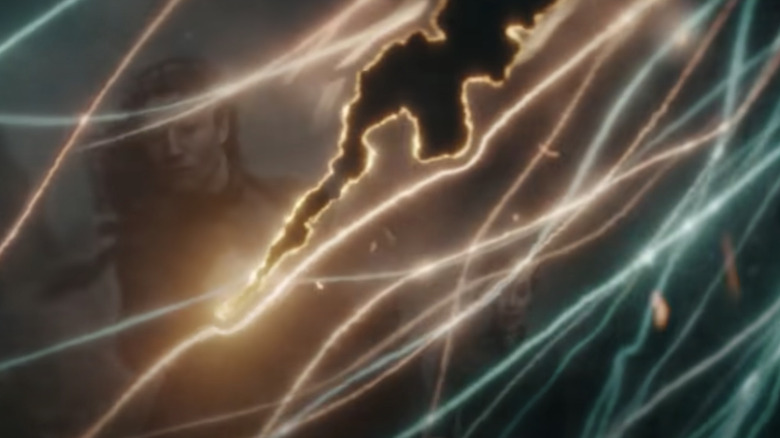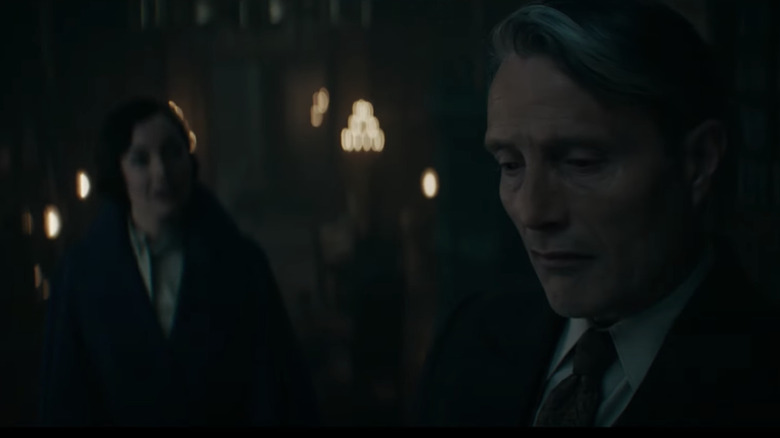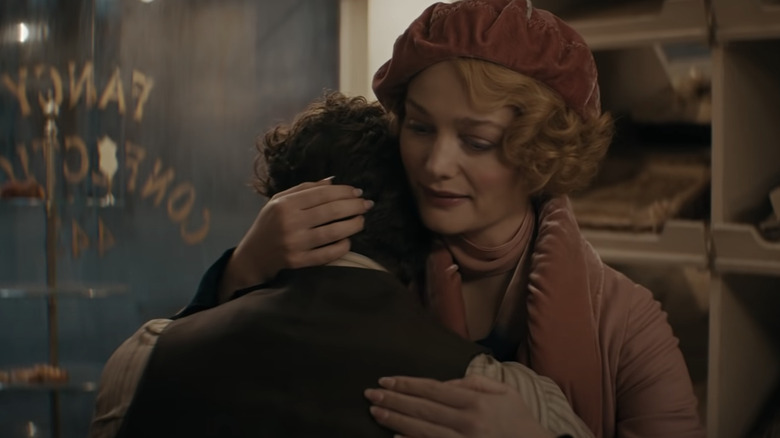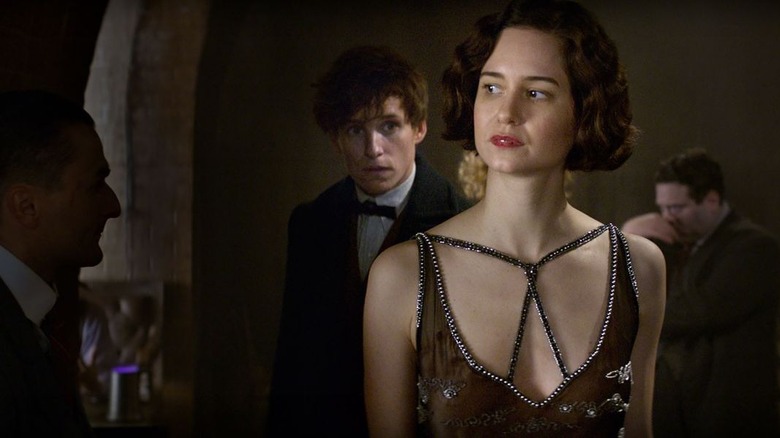The 6 Best And 6 Worst Things About Fantastic Beasts: The Secrets Of Dumbledore
The second film in the "Fantastic Beasts" franchise (2018's "The Crimes of Grindelwald") may have let down fans and critics alike, but with "Fantastic Beasts: The Secrets of Dumbledore," the Wizarding World franchise hopes to make things right.
While the film isn't a cure-all for the series' shortcomings, it's a few steps up from the first two films. The "Fantastic Beasts" films in general have struggled with navigating the dueling plotlines of centering the series around magical creatures while simultaneously telling the story of a savage dictator's rise to power — and it's never easy to stand in the shadow of iconic films like the "Harry Potter" series.
"Secrets of Dumbledore" straddles the line far better, finding a place for the film's creatures without taking away from the central plot, and even leaving time to drop into Hogwarts. By honing in on the politics of the wizarding world, "Secrets" builds the world considerably while offering a dash of hope for its quirky band of misfits.
While there are plenty of improvements with this film, it isn't all butterbeer and treacle tarts; romanticizing problematic behavior is never a great move, creature deaths are better left offscreen, and it's hard to not miss a fan-favorite absent from much of the movie. With that in mind, here are the (spoiler-heavy) six best and six worst things "Secrets of Dumbledore" has to offer.
Best: Dumbledore reveals that he fell in love with Grindelwald
Fans have waited for the Wizarding World franchise to officially address Dumbledore's sexuality ever since writer J.K. Rowling confirmed the headmaster had a love affair with Grindelwald in 2007. But with Rowling never offering any canonical confirmation, and two Dumbledore/Grindelwald centric "Fantastic Beasts" prequels having come and gone, fans had begun to think the day would never come.
Yet, at the beginning of "Secrets of Dumbledore," the love affair between Grindelwald (Mads Mikkelsen) and Dumbledore (Jude Law) goes from the author's mouth to the actors' lips. During a dinner chat with the burgeoning dictator, Dumbledore admits that he had previously gone along with Grindelwald "because I was in love with you."
There's no question about it. Dumbledore was in love with Grindelwald, as he later confesses to Newt and Theseus, and once more when he recalls Aberforth's summer of love by regaling his own, noting: "The summer Gellert and I fell in love." Not only does that hint at the affair being on both ends (to whatever extent Grindelwald is capable of love) but the dictator admits it himself during the final battle, asking Dumbledore, "Who will love you now?"
Worst: Jacob's wand fakeout
Fans were elated to see muggle Jacob (Dan Fogler) brandishing a seemingly-functional wand in the film's trailers. Alas, deceptive editing has struck once again, as the film elaborates that Jacob's weapon is made of snakewood and doesn't even have a core.
The bait-and-switch is frustrating for fans, since Jacob appeared to be chaotically casting some sort of tornado spell at a dinner party in the trailer. But in actuality, the effervescent Eulalie "Lally" Hicks (Jessica Williams) is the mastermind behind Jacob's wand work, all part of their ragtag group's efforts to confuse Grindelwald.
On one hand, it makes far more sense that Jacob isn't a no-maj born wizard yet to tap into his powers. After all, we've seen what happens when a child represses their magical abilities — and Jacob certainly isn't an obscurus. However, if he had just a teensy bit of lingering magic from an ancestor, it would explain why he so easily recalled magical events after getting obliviated.
Neither "Harry Potter" nor "Fantastic Beasts" have explored this possibility — but it makes sense that there are varying levels of powers in wizards. We already know this, as some wizards struggle with spell work, while others soar. So, who's to say there aren't people with a dollop of latent magic that can be used in a pinch, but isn't powerful enough to board the Hogwarts Express?
Technically, the movies could still explore this down the line, since Jacob's wand is a dud to begin with. But overall, the bait-and-switch is pretty lame. Adding insult to injury, when Jacob asks to keep his fake wand at the end of their adventure, Dumbledore replies: "I can't think of anyone more deserving." Wow Albus, you think this compatriot who just risked his life to help your cause is deserving of a worthless stick? Talk about faint praise.
Best: The Qilins' birth
Dumbledore and Grindelwald are two of the most compelling, mysterious, and utterly confounding characters in the Wizarding World franchise. With their epic plotline that has played out in these three films, it's easy to sometimes forget that the series is called "Fantastic Beasts" — Newt Scamander and his little critters often have felt like an afterthought.
"The Secrets of Dumbledore" brings the creatures back to the forefront of the story, making their appearances integral to the rapidly-darkening overall storyline. "Harry Potter" has always been heavy on mythology, and the Qilin's mythos in "The Secrets of Dumbledore" is directly tied to the film's upcoming election. Qilin are born when a new leader is about to rise, after all. In the new movie, these creatures aid in choosing the leader of the magical world, bowing to someone worthy of the title.
While being integral to the story, the Qilins' birth is also a stunning, impactful moment for the franchise as a whole. Not only do fans finally get to see the joy and wonder of Newt in the field, but the scene is also a reminder that it's not just humans impacted by humans' frequent quest for dominance.
Worst: Even before he's born, Snape is romanticized
The romanticization of Snape and Dumbledore was bad enough in the "Harry Potter" series when Harry named his son Albus Severus after "the bravest men he ever knew." Having watched the films and read the books, fans know that although both Snape and Dumbledore had their moments, Snape only turned away from Voldemort's murderous mission after killing Lily, a woman he essentially stalked for years.
Prior to his redemption, Snape was perfectly content to let Lily's son and husband die at the hands of daddy dictator Voldemort. So, his rebellion against Voldemort wasn't exactly noble; he even went on to bully his supposed love's son for seven years. Yet, despite Snape's incel behavior toward Lily and his selfish, obsessive love for her, fans still romanticize the word "Always." The line comes in the seventh book and film when Snape uses his Patronus in front of Dumbledore. When Dumbledore sees that Snape's Patronus is still Lily's stag, he asks, "After all this time?" Of course, Snape replies, "Always."
Cut to "The Secrets of Dumbledore," when Aberforth meets his son Credence (or Aurelius), who asks, "Did you ever think of me?" Aberforth says, "Always." Not only is it an unnecessary nod to Snape, but it's also more proof that Aberforth knew about his son and did little to nothing to find him. In some ways, at least both characters kind of suck.
Best: Hogwarts is home
The "Fantastic Beasts" films give fans an adult glimpse at the wizarding world that offers a different perspective than what audiences got from the original movies — in a way, it's that odd sensation of dropping in on your old elementary school, re-appraising what once seemed so vacuous and intimidating through the eyes of a grown-up. Nevertheless, it sure is nice to come home.
While the first two "Fantastic Beasts" movies featured Hogwarts minimally, "Secrets of Dumbledore" recaptures the unbridled magic from the "Harry Potter" films. The adult fandom can now relive their youth with a nostalgic homage that doesn't take away from the plot.
The movie treats fans to gorgeous arial shots of Hogwarts, filled with nods to the original series; a flying Gryffindor quidditch player goes after a snitch, a Great Hall scene has Slytherins feeding Jacob cockroach clusters, and a couple of skeptical Gryffindors eye Jacob's supposed wand.
Moments in The Hogs Head, the Room of Requirement, and even an appearance from McGonagall will transport fans directly back to their childhood, providing valuable reminders of why this battle is so important. While the "Fantastic Beasts" films have adults waging this war against tyranny rather than children, they are fighting for the future that will give those children their moment in the sun; there's a certain generational beauty to that.
Such scenes serve as potential metaphors for our lives, reminders that, for the sake of our children, adults need to step up and battle for what will make the world a better place. Hogwarts will never stop being home for fans, and these reminders of what's at stake puts the overall battle into grand perspective.
Worst: The Qilin kneels for Dumbledore
Given that Dumbledore was Harry's hero and mentor in the original series, which takes place from the young wizard's point of view, it's only natural that he would glamorize the headmaster's behavior. However, "Fantastic Beasts" is an adult series, and it's time to hold Dumbledore accountable for his actions. Without a naive tween leading the story, there's no reason to once again put Dumbledore on a pedestal.
Dumbledore certainly isn't a bad person, and he does make the noble choice to avoid all power positions, knowing full well that he's easily seduced by such power. He did fall for Grindelwald and his "for the greater good" tagline, after all. So, why is it that after it's been established tenfold that Dumbledore should avoid power, the Qilin kneels down before him?
One of the greatest lines in "Harry Potter" comes from Dumbledore himself.
"It is a curious thing, Harry, but perhaps those who are best suited to power are those who have never sought it," he says in "Harry Potter and the Deathly Hallows." "Those who, like you, have leadership thrust upon them, and take up the mantle because they must, and find to their own surprise that they wear it well."
Well, Dumbledore sought power big time on his quest for the Hallows, and even decades later in the "Harry Potter" series he was easily seduced by the Death ring's power. The Qilin bowing to Dumbledore undoes all those lessons, and feels like pure fan service. Given that the movie's title is "Secrets of Dumbledore," it would be nice if the film honed in on the mysteries and mistakes of Dumbledore rather than painting him in a flawless light ... yet again.
Best: The movie ups the political ante
Both the "Harry Potter" and "Fantastic Beasts" movies are inherently political in nature, given that they feature dictators rising to power. Yet, since the original series took place at a school filled with youngsters, it prevented fans from diving too deep into the politics of it all. Now, with adult characters hailing from various countries, "Secrets of Dumbledore" offers the most in-depth look yet at wizarding politics and how an election is held.
The film explores ancient rituals for determining new leaders, with such elements as the introduction of the Qilins. The tie-in offers a magical touch to the politics that we never saw when Cornelius Fudge was busy being aloof in the original films. The movie also rectifies the second film's mistake of glamorizing Grindelwald with new quotes that blatantly say, in effect, dictators are bad.
While Anton Vogel (Oliver Masucci) makes the awful move of clearing Grindelwald of all charges (despite witnesses and ample evidence of his crime), his quote that "A peaceful transfer of power marks our humanity" certainly speaks to the highest ideals of politics.
But Grindelwald has no plans to do that. Dumbledore warns that dangerous times favor dangerous men and says, "The world as we know it is coming undone. Grindelwald is pulling it apart with hate."
All in all, the movie manages to add a touch of magic to the politics of the series while honing in on how a megalomaniac like Grindelwald could manipulate voters and hold an election hostage. Luckily, Newt and his merry band of misfits make Grindelwald's reign as an official leader short-lived; this would have been only the beginning of Grindelwald's reign of terror.
Worst: Not explaining Grindelwald's makeover
The recast from Johnny Depp to Mads Mikkelson is striking, but it's not just the change in actor that is glaringly obvious. Grindelwald's entire aesthetic, from hair all the way down to his personality, is completely reimagined in the new film. Unlike, say Rhodey in the Marvel films, there doesn't even seem to be any effort to make them feel the same — which will make it difficult to re-watch the "Fantastic Beasts" movies together someday.
Nevertheless, it might be smart; Mikkelson and Depp are two extremely different actors, and it seems foolhardy to ask the former to mimic the latter. So, it's refreshing to see Mikkelson play the character with more of a simmering, twisted approach than the overt, maniacal way Depp approached it. The plotline calls for a charming, duplicitous quality to the dictator for his rise to power to be believable, after all.
If "Secrets" had offered a tangible reason for Grindelwald's new appearance, however, it would have made the films flow so much better. With established Wizarding World magic like polyjuice potions and metamorphmaguses at their disposal, the franchise already offered Rowling, co-screenwriter Steve Kloves and director David Yates multiple opportunities to explain this transformed Grindelwald. Such things are easy to explain in the Wizarding World, and failing to do so can be frustrating for the fandom.
Heck, even a clever "Roseanne"-type moment ("I like the second Darrin much better!") would at least acknowledge the re-casting elephant in the room. Dumbledore could have said something to the tune of "You look different!" or "Did you do something with your hair?" when he first sat down with this new Grindelwald.
Best: The final battle scene
Magical creatures were the name of the game in 2016's "Fantastic Beasts and Where to Find Them," but "Crimes of Grindelwald" was a messy mishmash of a sequel. Now, "Secrets of Dumbledore" takes fans back to what they love most about the Wizarding World franchise: the magic.
Most of the "Harry Potter" movies had at least one epic, wand-wielding duel, particularly in the later installments. "Secrets" does a terrific job escalating tension as it gets to the big election — and a final battle in its aftermath, the first significant clash between Dumbledore and Grindelwald that we've seen onscreen.
Witnessing Grindelwald's murder of the Qilin serves as a reminder that he is a dangerous, ruthless man; things are escalated further when he uses the Cruciatus Curse on Jacob and fires a killing curse at Vicência Santos (Maria Fernanda Candido) when she takes away his election victory. Not only does the moment show Grindelwald's murderous impulsivity, but it also offers a glimpse at what Grindelwald is truly capable of when he declares war on the muggle world.
Grindelwald's spell of pure hatred, combined with Dumbledore's attempt to protect Vicência, result in a spell vortex (not unlike the one Harry and Voldemort will later share); for Grindelwald and Dumbledore, there's an added level of heartbreak when the pair audibly hear each other's heartbeats. After the blood troth breaks, dissolving their oath, Grindelwald delivers the cutting line "Who will love you now, Dumbledore?" He also says, "I was never your enemy ... then," declaring war on Dumbledore just as much as the muggles.
The result is far and away the most climactic ending to any of the "Fantastic Beasts" films. It also carries with it an appropriate level of heart, magic, incredible special effects, and a tease for what's to come.
Worst: Grindelwald murders the Qilin
If you check the website Does the Dog Die before tuning into any movie involving an animal, you're not alone. But a good fantasy movie plays off our love of animals, convincing us that dragons and wookies and gremlins have the same endearing characteristics that make our dogs, cats or goldfish life's great companions.
It can be painful and even triggering to watch creatures get brutally murdered — even pretend ones.
With "Secrets of Dumbledore," fans are forced to bear witness to not one, but two savage death scenes for the angelic, deer-like Qilins. After Newt assist in the wondrous birth of the Qilin twins, a group of Grindelwald's minions show up, firing killing curses at them. One hits the momma Qilin, and we watch her slowly die as she sees her baby carted off by the enemy before Newt notices the second baby. With one tear running down her eye, she dramatically perishes.
As if that wasn't bad enough, once Grindelwald gets his hands on one of the Qilin babies, he slashes its throat in cold blood, just to resurrect it as some bastardization of the species that will do his bidding. The scene is anguishing to watch, and marks a pivotal turning point for Queenie (Alison Sudol) — who, like the audience, witnesses the atrocity.
Both scenes remind fans how power hungry and despicable Grindelwald and his followers have become; they are also very difficult to watch.
Best: A hopeful wedding
The heartbeat of the "Harry Potter" franchise has always been a threefold of love, loss, and the will to keep fighting. While the ending of "The Crimes of Grindelwald" seemed like it could be a final nail in the coffin of Queenie and Jacob's sweet romance, "The Secrets of Dumbledore" reminds fans that almost no one is beyond saving — if they choose to be better.
It's no secret (not even to Dumbledore), that vile people like Grindelwald can control the masses through fear-mongering and exploiting weaknesses. Despite Queenie's efficiency in legilimency, she's seduced by the fake world Grindelwald paints for her where muggles and magic folks can love freely. Of course, Grindelwald has no intention of making that vision a reality — but like most dictators, he lures people into acts they would not normally commit by throwing out false promises. It's slow, insidious, and often difficult to recognize until it's too late.
Yet, despite Queenie's lapse in judgment, when she witnesses Grindelwald's cruelty firsthand, she can no longer abide — with the unwavering support of Jacob's love.
"Some mistakes are too big," the witch explains, but they're smaller when you have someone to help you carry the burden. Queenie's turn back to the right side of the war, the love she shares with Jacob, and their wedding at the end of the film are exactly what the characters and fans need to keep fighting for a future of love and tolerance rather than hopelessness and hate.
Worst: Tina is barely in the movie
Porpentina Goldstein (Katherine Waterston) has been a staple of the "Fantastic Beasts" films from the very beginning. While she's underutilized in "Crimes of Grindelwald," her absence is even more noticeable in "Secrets of Dumbledore."
The handful scenes she appears in consist of her simply reacting to the film's events without much substance; given that she was promoted to the head of the US Auror office offscreen, her absence is even more perplexing. It's reasonable to assume that she would help out with some of the political uprisings shown throughout the movie. Sure, she's busy, but she should also be busy here.
The movie doesn't even have a throwaway line that Tina is on a top-secret assignment, either. She's just ... absent. Theseus Scamander (Callum Turer) also got promoted to the head of the British Auror office, and he's deeply embroiled in the film's events. As a result, Tina's already questionable absence is made more glaring by her British counterpart having all the fun in countries outside his apparent jurisdiction.
Of course, while "Secrets of Dumbeldore" is set in the 1920s, the film was made in the all-too-real treacherous reality of the early 2020s. The best guess is that COVID-19 perhaps made it difficult to get all he actors back on set when needed. But whether that's the cause or not, it's the movie's job to have Tina's absence make sense plot-wise, and in that respect it really falls short.
